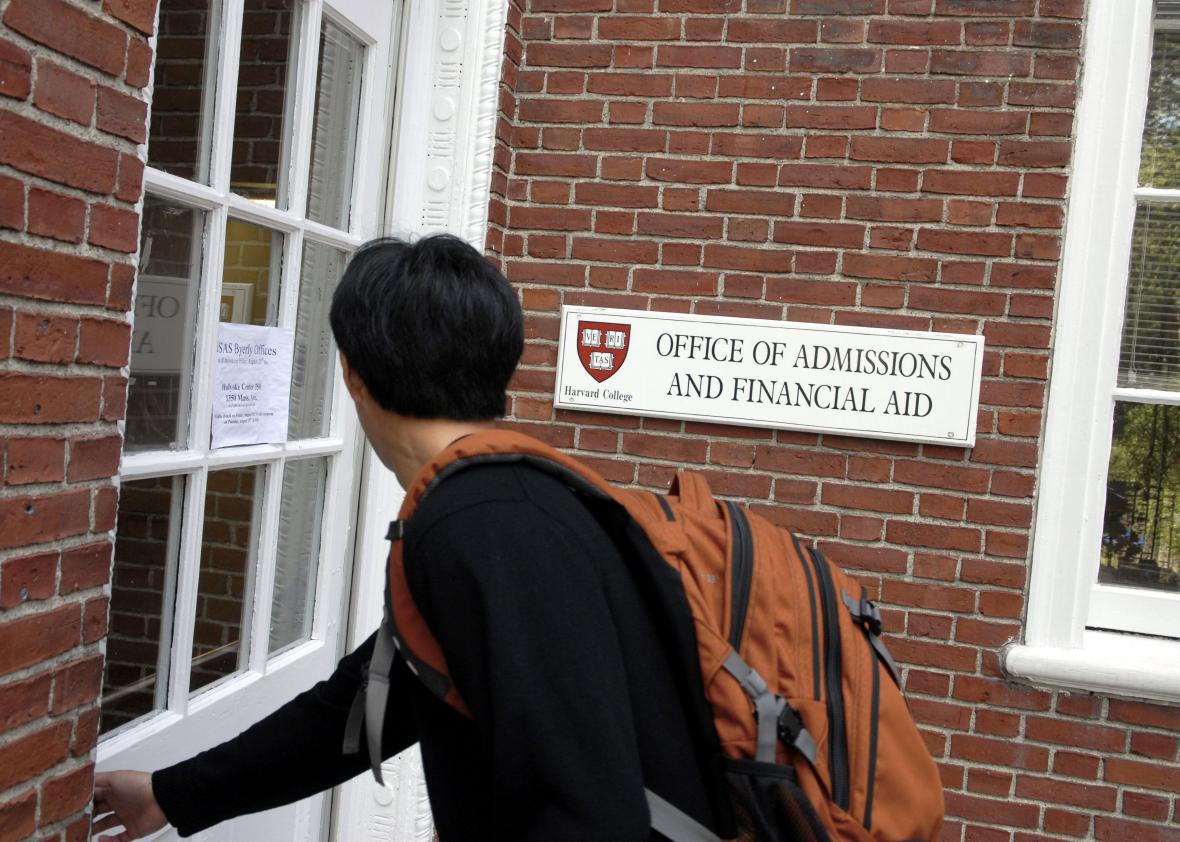The Department of Justice is investigating Harvard University’s admissions practices under Title VI of the Civil Rights Act of 1964, according to a report in the Wall Street Journal that confirms previous indications that the Jeff Sessions–led DOJ would challenge affirmative action policies meant to increase diversity at elite universities. The DOJ’s investigation centers on a still-pending lawsuit accusing Harvard of discriminating against Asian American applicants that was filed in 2014 by Students for Fair Admissions, a nonprofit headed by conservative legal strategist Edward Blum.
According to the Wall Street Journal, the DOJ sent two letters to Harvard’s lawyers that confirm the existence of an investigation and threaten litigation if the university does not provide internal admissions documents before Dec. 1. “Harvard has not yet produced even a single document” even after the DOJ’s initial deadline of Nov. 2, reads one letter signed by acting assistant attorney general John Gore. For its part, Harvard cited student privacy concerns and questioned the department’s authority to investigate the complaints nearly three years after they were first raised.
The confirmation of a Title VI investigation into admissions practices that consider race as a factor follows the New York Times’ August discovery of a Justice Department job posting that sought attorneys to work on “investigations and possible litigation related to intentional race-based discrimination in college and university admissions.” The Justice Department subsequently clarified that the position was intended to address a 2015 administrative complaint (also targeting Harvard for alleged bias against Asian Americans) put forward by a coalition of Asian American groups that oppose affirmative action. In October, Buzzfeed pointed out a slippery response to a Freedom of Information Act request that suggested an ongoing investigation of Harvard’s admissions process. Of course, given the current head of the Justice Department, this hostility toward affirmative action shouldn’t come as a surprise: In 1997, then–Alabama Sen. Sessions remarked that the practice was “a cause of irritation and perhaps has delayed the kind of movement to racial harmony we ought to be going forward [with] today. I think it makes people unhappy if they lost a contract or a right to go to a school or a privilege to attend a university simply because of their race.”
The Wall Street Journal report notes that an Obama-era leader of the DOJ’s Civil Rights Division, Vanita Gupta, called the Harvard investigation “highly irregular” because the Department of Education had previously dismissed the 2015 complaint. (That same year, it also cleared Princeton of charges of anti–Asian American discrimination after a nine-year investigation.) In October, Lawyers’ Committee for Civil Rights Under Law President Kristen Clarke characterized the DOJ’s approach to affirmative action as “an unprecedented assault on efforts to promote racial diversity in higher education.”
While the Supreme Court has upheld the constitutionality of affirmative action, notably in 2016’s 4–3 decision to side with the University of Texas against Abigail Fisher, an aggrieved applicant to whom the college had denied admission, that hasn’t stopped activists from decrying the policies as unfair or quieted the debate in which both sides cite reams of data purportedly backing their case.
Edward Blum, the activist who lodged the 2014 complaint against Harvard and recruited Fisher as a poster child for “reverse racism,” is particularly relentless in this regard; a New York Times profile described him as “a one-man legal factory with a growing record of finding plaintiffs who match his causes, winning big victories and trying above all to erase racial preferences from American life.” After losing a congressional race in Houston in 1992, Blum brought a case to the Supreme Court that found the gerrymandering of the districts along racial lines unconstitutional. More recently, he orchestrated the 2013 case that prompted the Supreme Court to strike down a section of the Voting Rights Act that mandated certain regions to obtain pre-clearance before altering voting laws.
Whether Blum’s anti–affirmative action work (which receives ample funding from the conservative-leaning DonorsTrust organization) will alter Harvard’s affirmative action policies rests on the outcomes of the Justice Department’s investigation and the civil suit still pending in a Boston federal court. This year, Harvard admitted its first majority-minority class. The proportion of Asian applicants in 2015 (21 percent) nearly mirrors the Asian proportion of enrolled students in the class of 2019 (23.5 percent). But if the Justice Department’s investigation results in a judge ruling that the Ivy League school has violated Title VI, the court would have authority to change admissions policies or take other remedial actions.
